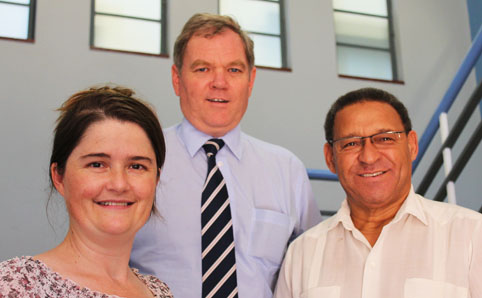Latest News Archive
Please select Category, Year, and then Month to display items
02 January 2025
|
Story Gerda-Marie van Rooyen
|
Photo Supplied
 Leading the research in South Africa is Prof Linus Franke from the Department of Soil, Crop and Climate Sciences.
Leading the research in South Africa is Prof Linus Franke from the Department of Soil, Crop and Climate Sciences.
Scientists are actively pursuing the successful breeding of diploid hybrid potatoes from inbred lines. This is expected to revolutionise potato breeding as it holds the key to rapid genetic progress. It will introduce new varieties for commercialisation through seed. Currently, existing potato variants have a gene that renders self-pollinated seeds infertile.
Prof Linus Franke, an academic in the Department of Soil, Crop and Climate Sciences at the UFS, is leading the research in South Africa. “This technology allows the production of genetically uniform potato seed that is easy to transport and largely disease-free.” He says this differs from conventional breeding whereby only vegetative propagation is possible due to tetraploid varieties in potatoes. It also risks carrying pests and diseases from one generation to the next – leading to the accumulation of pests and diseases with each round of multiplication.
Seed innovation
Prof Franke explains that Solynta BV, a seed company based in the Netherlands that produces potato varieties that can be grown from seed, has included South Africa in their research efforts because it is one of Africa’s largest producers and exporters. Through his academic relationship with Wageningen University and Research, a Dutch institution renowned for its agricultural endeavours and food production, the UFS became involved in researching hybrid potatoes grown from seed.
Diploid seeds containing two sets of chromosomes allow easier gene manipulation to increase predictability and speedier genetic progress. The breeding approach enables the incorporation of tolerance to pests, diseases, abiotic stresses (cold, heat, drought) and other desired genetic traits.
Although Prof Franke is optimistic about this research, he is not blind to disadvantages. “Potato seeds are tiny and have little energy reserves, making it harder to grow potatoes from seed than from tubers.” He says potatoes from seed will take longer to cultivate than tubers, as farmers need to grow plantlets from seeds first, adding six weeks to the growing period. “It is possible that commercial farmers can grow potatoes directly from seed. Alternatively, perhaps more likely, specialised growers will produce tubers of potatoes from seed; these tubers are then sold as seed tubers to other potato farmers, who then continue their normal practices of producing potatoes for the market from tubers.”
Financial benefits
Prof Franke says farmers have reason to get excited. “Seed potatoes will reduce input costs, as varieties with enhanced tolerance to pests and diseases require less pesticides. Planting one hectare of potatoes requires three to four tonnes of potato tubers, but only one 25 g packet of potato seeds.” Since potatoes are a more valuable commodity than maize, this technology might also increase farmers’ income potential.
Do universities need theology faculties?
2012-03-27
 |
|
From left to right: Ms Anlené Taljaard, Department of Systematic Theology, Prof. Francois Tolmie, Dean: Faculty of Theology and Prof. Alan Boesak of the International Institute for Studies in Race, Reconciliation and Social Justice. All three are from the UFS.
Photo: Leonie Bolleurs
27 March 2012
|
Challenges facing training in theology in South Africa was the focus of a public lecture by Prof. Alan Boesak of the International Institute for Studies in Race, Reconciliation and Social Justice at the university. Prof. Boesak is one in a series of speakers who were invited by the university’s Faculty of Theology to discuss the broader theme of the transformation of knowledge. The presence of a faculty of theology at a public university has been a point of discussion in many circles.
“Our country needs an RDP of the soul and who better than the theology faculties to make a contribution in this regard?” asked Prof. Boesak.
“An important challenge for a faculty of theology lies in the content that theology students learn. Does the content reflect the context of South Africa today? Theology students must be prepared to make a positive, meaningful contribution in their congregations and communities within the realities of South Africa,” Prof. Boesak said.
Prof. Boesak’s lecture was attended by not only lecturers and students in theology, but also staff members from several other departments on the university’s Bloemfontein Campus.
Several national and international speakers will present guest lectures during the year in order to sketch a more complete picture of the “transformation of knowledge”.